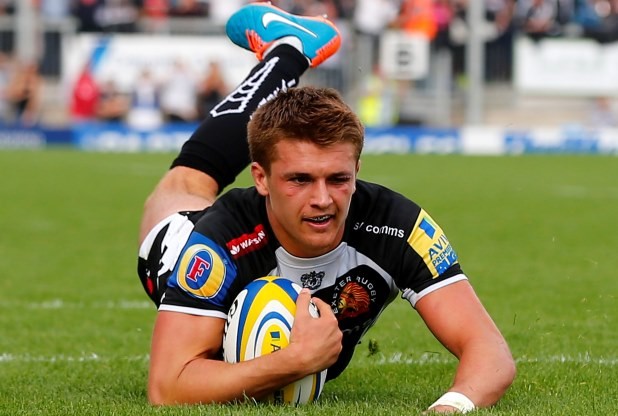Exeter Chiefs fly-half Henry Slade was recently called into England’s Six Nations squad, but upon being diagnosed with type 1 diabetes at 18, he didn’t know if he had a future in rugby.
The 22-year-old has spent the last three years learning about his diabetes and how best to manage it, all while maintaining his developing rugby career.
Henry has not let his type 1 stop him, though. He won the Aviva Premiership player of month for February and has been tipped for big things by England head coach Stuart Lancaster.
Henry spoke exclusively with Diabetes.co.uk about his journey since becoming type 1 and how he has developed his current medication routine.
Q. How did you come to be diagnosed with type 1?
“I wasn’t actually ill when I was diagnosed. I tested on a blood glucose meter and it was high so I went to the doctors.
“I didn’t lose weight, get ill or become thirsty a lot, though. I gradually had to give myself more insulin as time went on and now I am fully diabetic, but they caught it early so it wasn’t too bad.”
Q. How did you feel when you were diagnosed but all you wanted to do was focus on rugby?
“Well, my dad has had diabetes for as long as I’ve been alive so I sort of knew what it was like. All I could think was: ‘I want to be a rugby player’. I’d just signed my first professional contract at Exeter and I was questioning: ‘Can I do that?’
“Fortunately, I was told: ‘You can do whatever you want, you’ve just got to have control.’”
Q. Was there much trial and error when you were first starting medicating and playing rugby?
“I was often higher because of adrenaline. If my blood sugar was 7 or 8 mmol/L before I went out for a training session, I’d have a couple of jelly babies which would last me up to an hour and a half. Although, if I was to do that before a match I’d come in with a higher blood sugar.
“So I had to adapt little things like having an insulin jab before a match or at half-time to compensate for the adrenaline. Chris Pennell, from Worcester Warriors, who also has type 1, spoke to me and said he injects before a match, so I’ve only recently started doing that.
“I’ve only had diabetes for three years, though and the first couple of years I wasn’t really thinking I could do that. It’s different going from training to matches and that’s probably the thing that I had to trial and error with the most.”
Q. Has having diabetes changed who you are in any way?
“Some people say that diabetes makes you more responsible and organised, but I think I was probably like that before anyway.
“I wouldn’t say it’s changed my life. You can still do everything you want to do, it’s just changing things like when you go out – you need something you can eat if you have a hypo. You also need to be aware of everything you eat so you can inject accordingly.”
Q. Did people close to you have a hard time understanding what having diabetes meant?
“When people ask about how you developed diabetes, they often think you’ve eaten too many sweets. Then there are people that think now I can’t eat any sugar at all.
“You don’t realise, though, that most people don’t have a clue and know nothing about diabetes. That can get a little frustrating, but then I sit back and think actually, that’s probably not their fault.”
Q. What advice would you give to anyone with diabetes who is concerned that it may hold them back?
“Well, the way I look at it is you can’t change what’s happened to you. I’ve got diabetes and it’s something I just have to live with.
“It’s frustrating having diabetes, but it doesn’t stop you doing anything. You can do whatever you want, it’s just about having control.
“It shouldn’t limit you any way physically, though. It’s not going to affect how fast you can run or how strong you are. It’s just a matter of controlling it and if you can do that then there’s nothing you can’t do.”
You can check out our Diabetes and Sport section for more information on managing diabetes during sport.
Picture credit: www.exeterexpressandecho.co.uk
UPDATE: Henry has been called up for England’s 2015 World Cup squad. England’s first game is against Fiji at Twickenham on September 18.
Congrats Henry Slade! Henry (who has T1D) has been named in the England rugby squad for the Rugby World Cup!
Posted by Diabetes.co.uk on Friday, 28 August 2015




